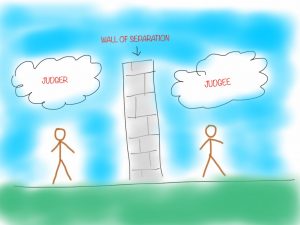One thing humans definitely excel at, in comparison to other species, is the art and act of judgment. We’re really good at judging one another, aren’t we?
Now, this post is on feeling judgment and does not address in any way the act of earning judgment. We all do that. We all deserve to be judged. Our great religions tell us that very clearly. But they also warn us against being the one who judges.
Of course, the gravest consequence of feeling judgment is guilt. That’s another thing humans are very adept at, again, in comparison to other species. And that is suffering from the pains of guilt…usually as a result of feeling judgment.
My own experience, especially these days, is that I feel a lot of judgment. And, certainly, I’ve earned it. But, again, the universal human activity of earning judgment is not relevant to this discussion.
I mean, it’s very difficult to get through an entire day without earning judgment for something, right?
What do I feel judgment for? Well, here are a few examples that quickly come to mind…
I feel judgment for being in Costa Rica and unable to visit my ailing mother.
I feel judgment for being separated from my children.
I feel judgment for economic failure.
I feel judgment for moral failure.
I feel judgment for adopting a political and philosophical mindset that is often at odds with those I love.
I believe the act of judgment is essentially one of separation. We judge others in order to place distance between ourselves and them. It makes us feel superior to do so. And our egos feed off that feeling of superiority.
The U.S. is a country where judgment is almost a way of life. We judge others on account of their political affiliation. We judge them according to their race, religion, or sexual orientation. We certainly are fond of judging folks based on their socio-economic status.
I believe that’s why the poor in the U.S. in some ways have it worse than the poor in other countries, like Costa Rica, for instance. Here you really aren’t judged by the make and model of the car you drive, or even if you have a car at all. But in the U.S., if you’re poor, you are made to feel judged. You are made to feel like a second-class citizen.
Of course, the ultimate acts of judgment are those which take place in our criminal courts. Those who are so judged then have to endure the most extreme separation from society, as they are locked behind concrete walls and steel bars. And then when they are finally allowed out of their cages, they are judged as unequal citizens, without the right to engage in society as normal non-felonized human beings.
I’m writing this post on feeling judgment today because it really sucks. As I mentioned, I’m on the receiving end of a ton of it these days, so I write from my own experience.
The act of judging another human being, even one as worthy of judgment as yours truly, does not really elevate the judge to a higher human status than that of the judged. You see, we all deserve to be judged in one way or another. None of us are perfect…far from it.
So, what do you think gives you the right to judge, other than this false feeling of superiority?
Maybe there’s a reason the bible has strong admonitions against judgment, where it says…
Do not judge, or you too will be judged.
Matthew 7:1
I believe compassion is a more effective tool for rehabilitation than judgment. It seems I’m fairly alone in that sentiment, but I truly believe it nonetheless.
I believe we need to stop being quick to judge and separate and start being more prone to forgive and connect. Tweet it Out!
What do you think?

[…] non of the American “can-do” spirit, to never ask for help and to look down upon, or judge, those who […]